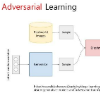We are interested in developing a unified machine learning model over many mobile devices for practical learning tasks, where each device only has very few training data. This is a commonly encountered situation in mobile computing scenarios, where data is scarce and distributed while the tasks are distinct. In this paper, we propose a federated few-shot learning (FedFSL) framework to learn a few-shot classification model that can classify unseen data classes with only a few labeled samples. With the federated learning strategy, FedFSL can utilize many data sources while keeping data privacy and communication efficiency. There are two technical challenges: 1) directly using the existing federated learning approach may lead to misaligned decision boundaries produced by client models, and 2) constraining the decision boundaries to be similar over clients would overfit to training tasks but not adapt well to unseen tasks. To address these issues, we propose to regularize local updates by minimizing the divergence of client models. We also formulate the training in an adversarial fashion and optimize the client models to produce a discriminative feature space that can better represent unseen data samples. We demonstrate the intuitions and conduct experiments to show our approaches outperform baselines by more than 10% in learning vision tasks and 5% in language tasks.
翻译:我们有兴趣在很多移动设备上开发一个统一的机器学习模型,用于实际学习任务,每个设备只有很少的培训数据。这是移动计算假设情景中常见的一种常见情况,即数据稀少,在任务不同时分散。在本文中,我们提议一个联合的少发学习框架(FedFSL),以学习一个能够用少数标签样本对隐蔽数据类别进行分类的微发分类模型。根据联合学习战略,FedFSL可以使用许多数据源,同时保持数据隐私和通信效率。有两个技术挑战:1)直接使用现有的联合学习方法可能导致客户模式产生的决定界限不吻合,2)限制对客户的类似决定界限将超过培训任务,但不能很好地适应不可见的任务。为了解决这些问题,我们建议通过尽量减少客户模式的差异来规范本地更新。我们还以对抗方式制定培训,并优化客户模式,以产生能够更好代表隐蔽数据样本的有区别的特征空间。我们演示直觉并进行实验,以便在学习5项语言任务中以超过10%的方式展示我们的方法超越基线。





